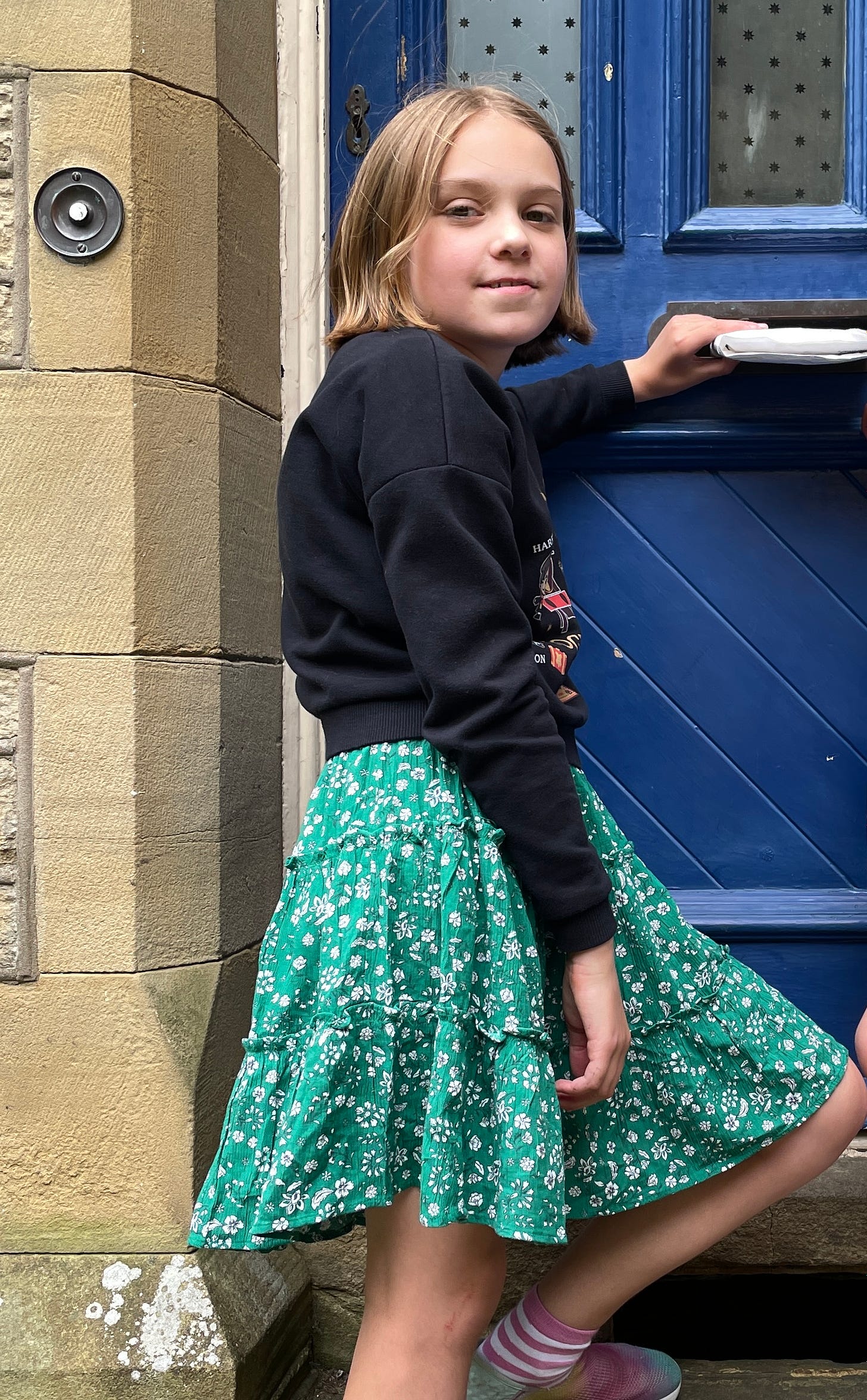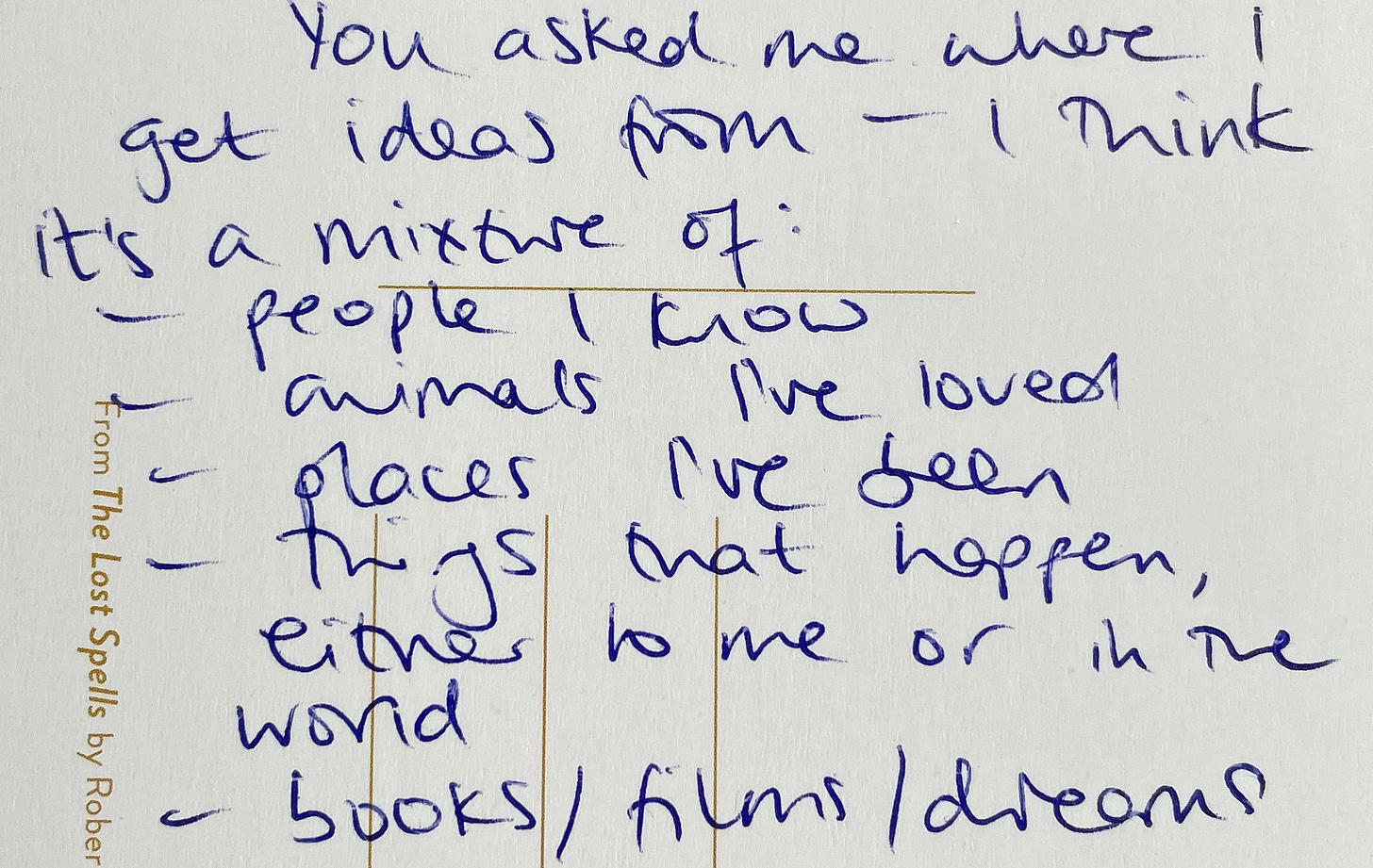Where do you get your ideas from?
Insight bias - why we prefer having ideas rather than making them happen, some inspiring links & notes on keeping going.
Hey there, Bec here
I’ve been reading a lot about creativity lately and came across some research into insight bias. It was one of those moments when things fell into place and I had a name for something I’ve experienced and observed. The concept of insight bias fascinates me because it explains why we prefer the experience of having ideas rather than making them happen.
I was reminded of this last week when I took my niece Ruby book shopping. She was after the latest book by her favourite author Liz Flanagan. Liz is a good friend of mine1 so I suggested we ask her to sign the book.2
Ruby decided to use that opportunity to ask a question, something that will be familiar if you’ve ever attended a reading by an author. The question was:
Where do you get your ideas from?
Do you have a bias for ideas?
So, back to insight bias. Creativity comes from two different paths, what researchers call insight (ideation or simply having an idea) and persistence (making that idea happen). I see this as a simple equation:
creativity = insight + persistence
When it comes to evaluating our creative performance, we have a tendency to overvalue insight and undervalue persistence.
Why? Because insight feels good, whereas persistence kind of sucks.3 That means we become biased towards and overvalue the fun part of the creative process and under value the importance of persistence. That matters because it can impact on our willingness and ability to keep going.
» Read more: Ways into freewriting
Ideas are fun to talk about
Ruby, being just nine, has not been taught anything about creativity. She doesn’t have a creative practice; she doesn’t have any creativity baggage and is yet to evaluate her performance or productivity. She is creative. She just creates.
Yet, she demonstrated that bias because it’s a great question to ask. It’s exciting to find out where ideas come from, especially from an author like Liz who writes books about dragons and witches and going on adventures with friends to fight off danger.4
I’ve spent a chunk of my career working with writers and hosting events with them. When authors get asked about their idea, they often light up. Ask them about their writing routine or creative practice and they are likely to gloss over the slog it was to write the damn book.
Persistence is boring - they might have a neat throwaway joke, but it is mostly them sat at their computer typing, swearing and occasionally crying. Sometimes there’s an epic tale of 10 years to pen a debut novel, rewriting it 20 times, switching from first to third person and back again, but often these are reduced to snappy highlights rather than the years of grind.
Does it matter that we are biased?
I’m not suggesting we spend our time talking about the suffering of our writing. That’s not what eager readers and new writers want or need to hear.
I am saying that it’s OK to prefer the fun part of having new ideas. Once we recognise our insight bias, it can help us manage the distraction of a shiny new idea. It can comfort us when we get stuck on the hard bit and we need all our powers of persistence to keep going.
After all, creativity is a combination of both insight and persistence. We need both.
Until next time, keep going, Bec
Where do you get your ideas from?
Postscript: Ruby didn’t get to ask her questions in person - it being summer holidays, Liz was away with her family. Instead, Ruby posted her a note with her question.
Liz replied saying she got her ideas from people she knows, animals she has loved and places she has been.
I’d love to hear where you get your ideas, if you have a bias towards that part of the creative process, and how you manage the siren call of a tempting new idea. Pop a comment below or send some ❤️
Insightful links and notes on persistence:
Read: three authors on how they keep going and the choices that involves, read:
- Three Productivity Tips For The Restless
- What will you give up to write?
- How I make time to write (paid)
Pre-order: Oliver Burkeman’s new book Meditations for Mortals: Four weeks to embrace your limitations and make time for what counts.
Listen: Elizabeth Day’s new pod class with a powerhouse trio of agent, author and publisher: How to Write a Book (she’ll be on Substack soon - subscribe to: Daylight by Elizabeth Day)
Learn: Already obsessed by Nonfiction Storytelling with Jon Ronson
My top tip for keeping going is joining
weekday Worm Zoom. Find out more on The Complete Worm SchoolIf you’d like some dry humour listen to Fredrik Backman bestselling author of A Man Called Ove (and many more) on the life of a writer on Instagram Sweden for Beginners.
I just finished reading the Korean fantasy novel DallerGut Dream Department Store - so good! Here’s a quote from Mr DallerGut himself:
“‘Inspiration is a convenient word. It makes you feel some grand ideas might come out of nowhere, as if from a blank slate. But in fact, a great idea hinges on how much time you have spent agonising over it, and that’s what makes all the difference: whether you have spent enough time searching for the answer or not. That’s the key. My friend, you just stuck around and agonised until you found your answer.’
I hope you give yourself the time to find your answers. And if you need a more words of wisdom from DallerGut, he goes on to say: ‘I am no expert in that area. I do suggest that you sleep as much as you work. If you wish to sing for as long as you like, that is. Sleep will help sort your mind.’
Back in the day, we were co-directors of The Ted Hughes Arvon Centre at Lumb Bank managing the writing courses, writers, house and grounds together. We both still live in Hebden Bridge and while we still talk a lot about writing there is far less conversation about blocked toilets and septic tanks.
One of my biggest treats is getting books signed by authors, for myself and as gifts for others. As well as introducing the next generation of readers to great writers, I pass on my other reading quirks, which include novelty book marks and more bizarrely I started a trend for reading gloves with my littlest nieces - being of a cold disposition and living in the north I wear gloves in bed to read. Apparently this is a highly desirable trait and now young readers (of warmer dispositions) like to wear reading gloves.
That’s my word for it, researchers prefer to talk about the effortfulness of meta-cognitive fluency.
I am biased but I love Liz’s books! If you have a young reader or writer in your life, do check out her website Liz Flanagan.










I like the quote about inspiration because, yes I often think it is something that will come out of nowhere and it'll drop on me unexpectedly, but in fact it definately is not.
Yes, thank you for posting this because it's nice to read that I am not the only one with a brain brimming with writing ideas. My biggest enemy is time as there doesn't seem enough time in the day to write in every direction I want to go so I usually start with poetry, because it tends to require more focus ie fewer. words. And the ideas for poems usually come from one of the five senses- something experienced on my morning walk. It could be a stranger asking for directions or it could be the observation of a dog preoccupied with smelling the daisies while its owner is absorbed by their cell phone. Any emotion, particularly frustration, may yield a piece of flash fiction and then there are the overheard bizarre conversations, that cry out for a story to frame them. Life is fun and what a joy to write about it.